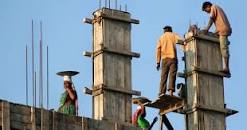NE NEWS SERVICE
NEW DELHI, MAR 25
The labour ministry has asked states to use Direct Benefit Transfer (DBT) for providing assistance to building and other construction (BOC) workers directly into their bank accounts instead of distribution of aid in kind, like ration or household use articles.
The Ministry of Labour and Employment has issued an order to use DBT for financial assistance to BOC workers and to put restrictions on distribution of benefits in-kind by the State Welfare Boards.
“In a recently issued order, the Ministry of Labour and Employment has directed the State Welfare Boards (SWBs) not to distribute articles and household items to the BOC workers and instead provide monetary assistance through Direct Benefit Transfer (DBT) into the workers” bank accounts,” a labour ministry statement said.
According to the statement, the order was circulated on March 22, 2021 to the Chief Secretaries, Principal Secretaries (Labour), Labour Commissioners and the Secretaries of the State BOCW Welfare Boards by the ministry under Section 60 of the Building and Other Construction Workers (Regulation of Employment and Conditions of Service) Act, 1996.
The Act aims at regulating the safety, health, welfare and other conditions of service of the construction workers through the State Welfare Boards (SWBs) in every state/Union Territory.
The ministry had noted that some SWBs were issuing tenders or incurring expenditure on distribution of household items such as lanterns, blankets, umbrellas, tool-kits, utensils and cycles instead of on tangible welfare measures such as life insurance, health insurance, disability cover, maternity benefits and old-age pensions for the workers.
Since the procurement adds layers to the entire process, with apprehension of leakages both at the procurement stage and at the distribution end, hence this decision was prompted, it said.
Transfer of money in the form of cash has been completely stopped by the instant order and any monetary assistance has to be necessarily given through DBT, the ministry added.
The order also puts a ban on the distribution of articles in kind.
It mentions that no benefit can be provided in-kind except in extraordinary circumstances such as natural calamities, epidemics, fire, accidents caused due to occupational hazard or similar other crises and only with the prior approval of the state government.
The law mandates the SWBs to spend the cess fund on payment of premium for pension, group insurance scheme, scholarships to workers” children, medical expenses, maternity benefits and loans for house construction.
It allows the boards to spend on such other welfare measures and facilities as may be prescribed.
It was observed that some SWBs had taken recourse to this sub-section of the Act and resorted to arbitrary use of cess fund for construction of buildings and distribution of articles and utensils instead of using it for the welfare of construction workers.
The cess fund is collected by the states at a uniform rate of 1 per cent on the construction costs of the public and private construction works. It is utilised by the SWBs for the welfare of construction workers, as per law.
It was effectively utilised in 2020 during the COVID-19 lockdown to mitigate the adverse pecuniary impact on the migrant construction workers.
An advisory was issued by the labour ministry on March 24, 2020 to all states to provide financial assistance to the affected BOC workers via DBT from the welfare fund maintained by them.
Most SWBs gave out grants ranging between Rs 1,000 and Rs 6,000 to the registered workers, it added.
As per the latest figures, Rs 5,618 crore was disbursed by SWBs to about 1.83 crore construction workers directly into their bank accounts through DBT, the ministry added.












